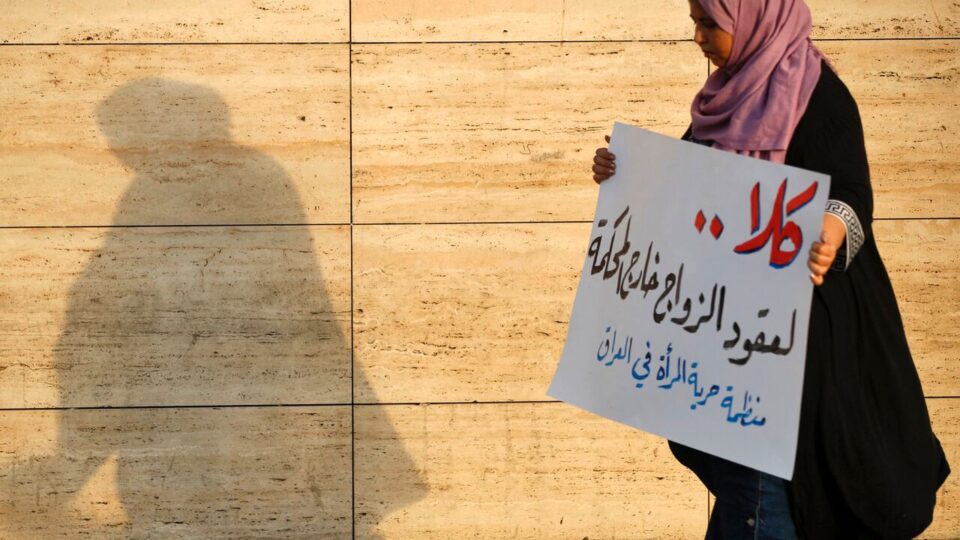A proposed amendment to Iraq’s Personal Status Law has ignited fierce debate, drawing criticism from human rights organizations, U.S. officials, and a majority of Iraqi citizens who fear it could severely impact women’s and children’s rights.
Human Rights Watch has strongly criticized the proposed amendment to Iraq’s Personal Status Law, which is on the Iraqi parliament’s agenda and expected to be voted on soon. The organization stated that if approved, it would have disastrous effects on the rights of women and girls. This comes in response to the “General Amnesty” law proposed by Sunnis, highlighting the complex political dynamics at play.
Sarah Sanbar, Iraq researcher at Human Rights Watch, said: “The passage of the draft law by the Iraqi parliament would be a devastating step for Iraqi women and girls, as well as for the rights they have fought hard to enshrine in law.” She added, “Officially and legally sanctioning child marriage deprives a large number of girls of well-being.”
The new law is set to be approved with a “jurisprudential record” issued by the Shiite and Sunni endowments, to become a basis for judges to rely on. The human rights organization believes that this would allow the marriage of nine-year-old girls, as well as remove the principle of equality under Iraqi laws, and eliminate protection for women in divorce and inheritance.
Human Rights Watch also expressed concern that the amendment, particularly regarding the implementation of Sharia laws according to the jurisprudential record of each sect, effectively creates different legal systems with different rights for other sects. They argue that increased sectarianism in Iraq violates legal rights and undermines equality for all Iraqis as stated in Article 14 of the constitution and international human rights law.
The organization pointed out that “unregistered marriages in courts create a loophole that allows child marriages in Iraq.” They also emphasized that the proposed amendment “nullifies and disrupts the protections provided to divorced women under the current Personal Status Law” and “will cause women to lose some of their inheritance rights.”
Furthermore, the organization concluded that the proposed amendment violates the Convention on the Elimination of All Forms of Discrimination against Women (CEDAW), which Iraq ratified in 1986, by depriving women and girls of their rights based on their gender. It also violates the Convention on the Rights of the Child, which Iraq ratified in 1994.
Alina Romanowski, the U.S. Ambassador to Iraq, joined the chorus of concern. She expressed her apprehension about the draft amendment on social media, urging Iraqis to engage in civilized dialogue and fully respect religious freedom and women’s rights. Her intervention underscores the international attention this proposed amendment has attracted. “We are concerned about proposed amendments to Iraq’s Personal Status Law that would undermine the rights of women and children. We urge Iraqis to engage in a civil dialogue that fully respects freedom of religion or belief and the rights of women and children,” Romanowski said on X platform.
Public opinion in Iraq seems to align with these concerns. A poll conducted by the “Iraqi Opinion Poll Team” revealed that more than 73% of Iraqis strongly reject the amendment. Approximately 61,648 Iraqi women and men participated in the poll, distributed across various regions of Iraq. Specifically, 73.2% of the poll participants strongly rejected the amendment, while 23.8% agreed with amending the law, and 3.1% did not support either side.
On August 4, 2024, the Iraqi Council of Representatives, by a majority vote, added the Personal Status Law amendment to its sessions’ agenda. This came after the Coordination Framework supported the law, allowing its first reading to be carried out. However, lawyer Ashwaq Najib told Kurdish media outlets, “The draft law to amend the Personal Status Law is currently suspended because most parties do not agree, but there is fear that the amendment of this law may pass by majority vote.”
Najib highlighted key points of concern in the amendment. She explained that during marriage, both parties would be free to choose whether they follow legal provisions or sectarian provisions. If the spouses are of different sects, the man’s sect would be imposed on the woman. Najib also pointed out that some sects believe a girl becomes an adult at the age of 9 and can marry, which she considers dangerous for the future of Iraq, especially for women.
Legal expert Sarkar Mahmoud provided historical context to Kurdish media outlets, noting that this is not the first attempt by Shiites to amend the Personal Status Law. Similar proposals were made in 2014 and 2017, facing strong opposition each time. Mahmoud explained that the current Personal Status Law, dating from 1959, is not tied to any particular sect and allows judges to make independent reasoning.
Crucially, Mahmoud clarified that the proposed amendment would not apply to the Kurdistan Region, which has its own parliament and legislative authority. He explained, “This amendment does not cover the Kurdistan Region, because since 1991, the Kurdistan Region has had its own parliament and legislative authority. Any law passed in the Iraqi Council of Representatives, to be implemented in the Kurdistan Region, must be enforced by the Kurdistan Parliament, then it is implemented.”
However, Mahmoud warned that having different laws within a federal state could create problems and difficulties, especially in cases involving inter-regional marriages or relocations.
The ongoing debate surrounding this proposed amendment highlights the complex interplay between religious traditions, women’s rights, and legal frameworks in contemporary Iraq. It also underscores the challenges of maintaining a coherent legal system in a diverse federal state with autonomous regions.

